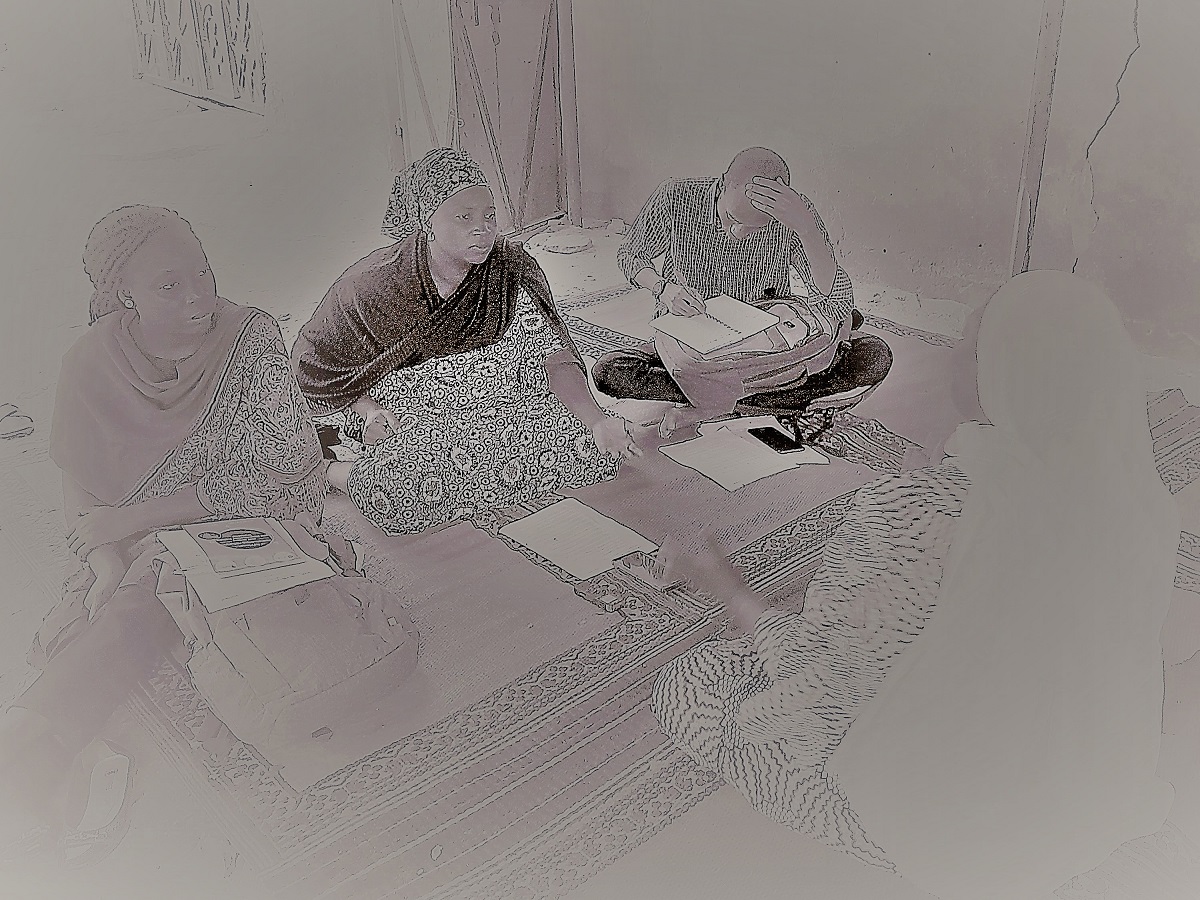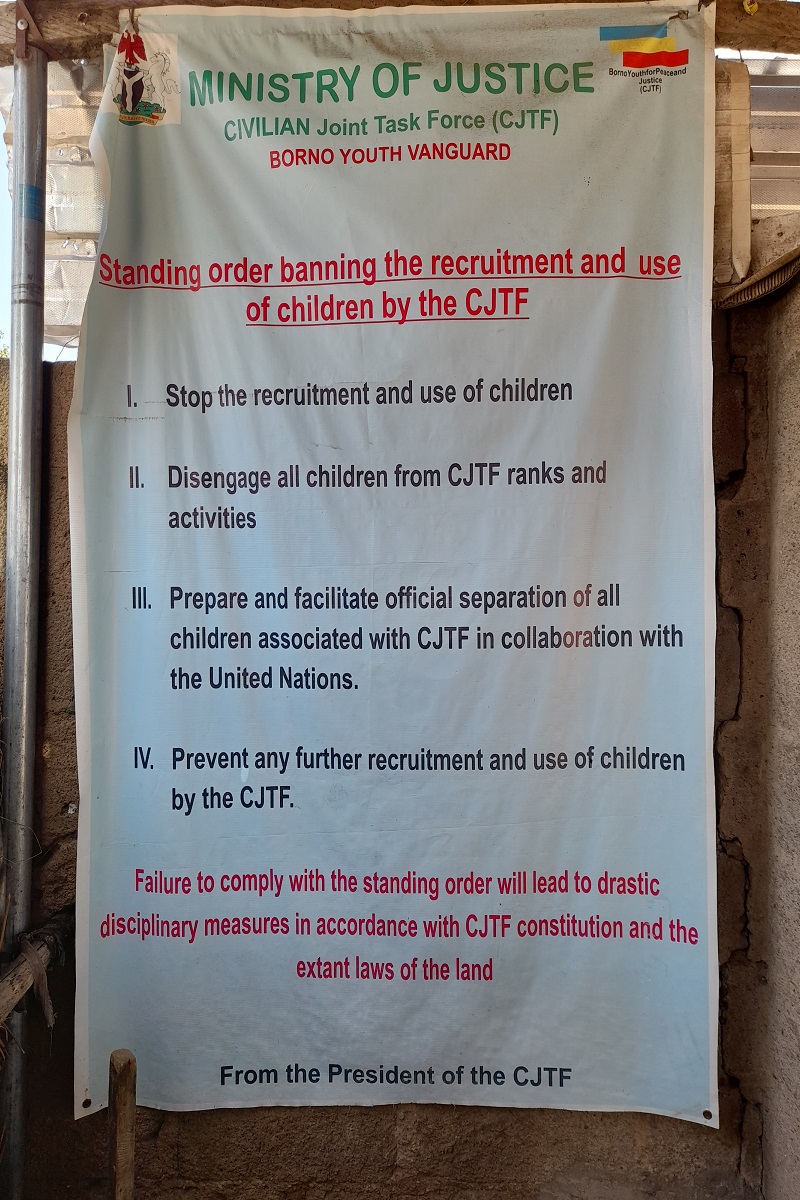While on fieldwork in Maiduguri, I met Aisha (not her real name), who introduced herself as the commander of the vigilante group in her community (Figure 1). I was pleasantly surprised and impressed – not just because she is a female member of the network of informal security providers but also because she occupies a high-ranking position in a male-dominated space.
But this story is not just about one woman; it is a broader discourse about representation, visibility and diversity in informal policing. It is also about how the lack of diversity affects informal policing, interactions with community residents and the enforcement of social control in communities in Maiduguri.
Though the theme of gender and policing has received attention in wider research, the emphasis has been on formal policing and women. (In)formal policing can be gendered in its composition, in the roles assigned to its members and in its responses to crime and social misconduct by members of the communities they serve.
Three questions come to mind in the context of informal policing in Maiduguri:
- How does the composition of informal security groups shape their interactions with different categories of community residents?
- How do informal security providers perceive and respond to (young) men and women deemed (potential) offenders?
- And how can gendered security needs be mainstreamed into broader informal security provisioning?
Insights from fieldwork in Maiduguri help to address these questions and the broader implications for urban security and informal policing.
Figure 1: Interacting with Aisha during fieldwork in Maiduguri

Gender imbalance in informal security groups
Informal security providers (ISPs) in Maiduguri, including traditional rulers, community security committees, vigilante, hunters’ groups and Civilian Joint Task Force (CJTF), are dominated by men. Due to cultural and religious norms, all the traditional rulers are men. Every community in Maiduguri is headed by a Lawan (ward head), who is supported by the Bulama(s) (ward scribe). The Bulamas constitute the community security committees.
In some communities, there are three separate committees: one for each of these groups – women, male youths and men. However, in one of the communities covered in this research, all 30 members of the committee selected by the Bulama and residents are “elders”, which, in the Nigerian context, typically refers to older men. Thus, in this community, elderly men make decisions on issues of safety and security that affect children, youths and women. This could be problematic, because men may not fully understand women’s vulnerabilities and their safety concerns. And when gendered safety and security needs are not considered, informal policing may be undermined.
Women constitute a very small proportion of the membership of the informal security groups. This lack of diversity is driven by social norms that project activities like informal policing as men’s work. And in communities where there are female ISPs, they are rarely visible and are often unknown, even by female members of the communities. Female ISPs often do not wear their uniforms publicly, due to the stigmatisation they face. The need to disguise and remain invisible is also linked to the role that female members play as informants for the ISPs.
Relatedly, the prevailing perceptions of female ISP members as morally bankrupt and as women of easy virtue (karuwa in Hausa language) has caused many women to shy away from enrolling. Furthermore, women who are interested in joining the ISPs usually have to obtain permission from their husbands or brothers – who have mostly disapproved of their intentions to participate in informal policing.
In terms of age, there initially was no age specification for membership of the CJTF. However, this was revisited after the United Nations (UN) raised concerns about the recruitment of children into the CJTF. Consequently, children were restricted from participating in informal policing and the state regulator of the CJTF issued a standing order banning the engagement of children by the ISPs (see Figure 2). Currently, only adults aged 18 years and over are allowed to be members of all informal security groups.
Figure 2: The CJTF regulator’s position on child recruitment

Gender roles in informal security provisioning
There are limited roles for women in the current practice of informal policing. Women usually serve as informants, being sent to infiltrate social events such as wedding ceremonies to gather information for the ISPs. According to one of the ISPs interviewed, women are suitable informants because they are chatty, especially when amongst other women, and so can apply this skill in intelligence-gathering. Since the predominant religion practised (Islam) prohibits men from having direct engagement with women (except their wives) and vice versa, women must work only with women. Being an informant is sometimes viewed as a simple task but, in reality, such roles place women in a position of vulnerability and potential harm. For example, women’s safety is compromised as they receive threats, are targeted for revenge and often risk being ostracised by other women in the community.
Women are also posted to the major market in Maiduguri, where their roles involve searching females suspected of shoplifting and hiding stolen items in their hijab. Women also keep watch at the riverbanks, to prevent underage or inexperienced kids from swimming and to report incidents of drowning to relevant authorities. Other roles, like using firearms to fight insurgents, keeping watch in the bushes and forests, night patrols and handling other violent or hostile situations, are allocated to male members of the informal security groups. The division of labour suggests that women are allocated what Silvestri referred to as “safer station assignments”, which are perceived to be less risky, while men handle the traditional masculine aspects of informal policing.
Men are disproportionately favoured over women in placements in leadership positions of informal security groups. The ISPs have unit chairmen in all communities, commander or chairman at the ward and sector levels and president or commander at the state level. Aisha is a rare example of a woman occupying a position of leadership in these groups.
Gendered responses to crime by informal security providers
Research has identified an entrenched masculinity in formal policing, which negatively impacts both men and women. This is also the case with informal policing, as the strategies used for the enforcement of social control and policing by the ISPs vary for different categories of people in the communities they serve. Residents’ differential experiences of informal policing are often exacerbated by gender stereotypes.
Preconceived notions and perceptions of young males as “wild and stubborn” shape how they are treated by the ISPs. The ISPs blame overprotective mothers for contributing to the deviant behaviour of youths in the communities. Thus, tagging male youths as recalcitrant means that they are policed more strictly than female youths by the ISPs. Some members of the CJTF even brag proudly about being feared by youths in the communities. The traditional rulers further affirmed that the youths only “listen” when the CJTF is involved in a matter.
As a result of such preconceived notions, all male suspects are deemed guilty until they are proven innocent. The ISPs have been accused of flogging male suspects, often inflicting grievous bodily harm and even causing death. For instance, a boy who was (falsely) accused of stealing a goat was tied upside-down to a stake and flogged by members of the hunters’ group until he died. Stories abound of the ISPs flogging youths who were later proven to be innocent. In all the interviews I conducted, however, not one mention was made of female offenders being flogged by the ISPs.
Male and female youths are also policed through the imposition of curfews to deter crimes against women and general immorality. This aspect of moral policing is particularly targeted at unmarried females, to prevent them from becoming “wayward”. One of the ISPs reported that “when parents send their female children on errands outside their homes by 5pm, they usually say no … because if they go out, they will be arrested by the ISPs”. When such girls are arrested, they are cautioned and released or forced to return home in the company of the ISPs. Residents also alleged that the ISPs often use “abusive and vulgar words” on youths who are arrested after curfew hours.
For incidences of domestic violence, it is deemed inappropriate and unacceptable for wives to report their husbands to the CJTF. Reporting is viewed as humiliating to the husband. Cases of domestic violence are reported to the traditional rulers, who are responsible for resolving such issues amicably. The cultural and religious norms shield men from the “embarrassment” they may face if issues of domestic violence are made public.
“Achieving gender equality in and through policing is not simply about increasing the number of women involved in informal security provision. It is also about transforming the power relations that perpetuate inequality and subservience.”
In some communities, there is a high prevalence of rape cases. The fact that the most active and visible members of the ISP groups are men means that if women choose to report incidents of rape to the ISPs when they occur, invariably they will be required to report them to men. Women are also not able to report a rape incident without the consent of their husbands. This is one of the reasons why some rape cases, including intimate partner violence, have remained unreported.
In one of the communities, a 13-year-old girl was raped, and became pregnant. The case was reported by her father to the Bulama. Her father requested “an amicable resolution”, which was for the offender to marry the victim to avoid the “shame” associated with such acts. The Bulama ordered the CJTF to arrest the offender, so that he would be forced to marry the victim. However, the Lawan intervened, and advised the Bulama to report the case to the National Agency for the Prohibition of Trafficking in Persons (NAPTIP). The timely intervention of the Lawan led to the prosecution of the offender.
This situation in Maiduguri shows how cultural and legal norms intersect with the gendered structures of informal security provision to shape gendered experiences of security in profound ways. It also reflects how a deficiency in training on appropriate measures for addressing gender-based violence could lead to improper handling of incidents and the potential denial of justice for victims.
Mainstreaming gender and gendered security needs in informal policing
It is evident that the underrepresentation of women and the dominance of men in informal policing has produced some negative outcomes in experiences and perceptions of safety and security in Maiduguri. The lack of diversity and representation of women in informal policing mirrors society and contemporary state policing across the world. Though the need for diversity is imperative, religion and culture remain significant constraints to the inclusion of women in informal policing in this city. Social norms place expectations on women that result in exclusion and reinforce patriarchal sentiments, (un)intentionally limiting women’s ability to express themselves and contribute to the safety and security of their communities.
Achieving gender equality in and through policing is not simply about increasing the number of women involved in informal security provision. It is also about transforming the power relations that perpetuate inequality and subservience. Thus, platforms like the community security committees, exclusively made up of and run by women, can be strengthened and utilised to understand the particular vulnerabilities and security needs of women. It is important for women to be active and not just passive agents of security provisioning in their communities. And the strategies for organising informal security to ensure gender inclusivity will be explored in a forthcoming journal article.
Header photo credit: Patience Adzande
Note: This article presents the views of the author featured and does not necessarily represent the views of the African Cities Research Consortium as a whole.
The African Cities blog is licensed under Creative Commons Attribution-NonCommercial-NoDerivatives 4.0 International (CC BY-NC-ND 4.0), which means you are welcome to repost this content as long as you provide full credit and a link to this original post.


